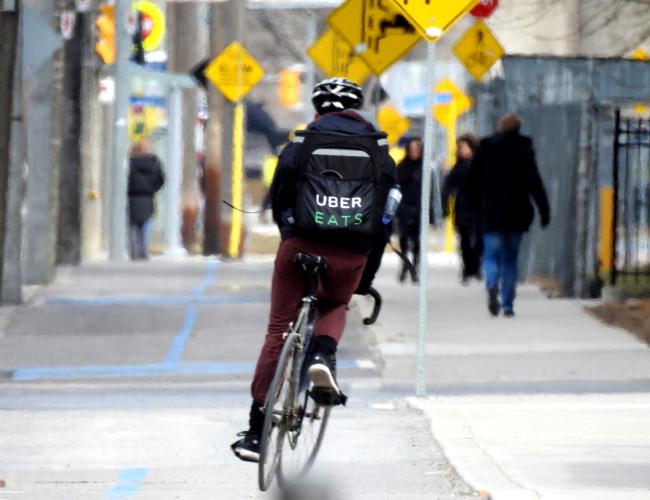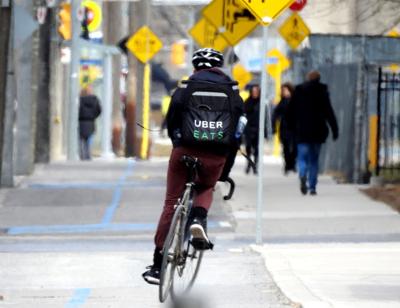Uber Eats has been a major convenience for 31-year-old Alan Dawn, who has a knee disability, and his family.
The Mississauga author says he has relied on grocery, toiletry and restaurant deliveries to his home ÔÇö especially now with two toddlers ÔÇö since the app became available in Canada.
But Dawn, who places about 20 orders a month, is among many app users who recently noticed the company has increased the service fee, which appears on the final page of checkout, by 25 to 63 per cent, making it increasingly unaffordable.
The service fee for restaurant delivery orders, which previously ranged from $2 to $4, is now priced between $2.50 and $6.50, according to Uber EatsÔÇÖs┬áwebsite.
“It’s frustrating that we have to think more about avoiding using a service that we enjoy, that has been really beneficial for us, just because of the way that they’re price-gouging,” Dawn said.
The change came after a ╔ź╔ź└▓ resident accused the company of drip pricing and ÔÇťmisrepresenting the true cost of its delivery servicesÔÇŁ by charging users a service fee ÔÇö separate from applicable delivery fees and only appearing on the final page of checkout ÔÇö in a proposed class-action lawsuit this May.
On July 1, OntarioÔÇÖs Digital Platform WorkersÔÇÖ Rights Act took effect, promising minimum-wage standards for gig workers on apps like Uber, Lyft and DoorDash.
Uber did not respond to questions from the Star about the reason for the fee increase or what the profits from the increase would be used for.
The food-delivery service has also been essential for ╔ź╔ź└▓ resident Joel Duff, who wakes up at 2 a.m. for his shift as a Canada Border Services Agency officer and returns home at 5 p.m.
Duff said he often finds himself too tired to cook after a 10-hour shift.
This week, he ordered a pizza from Uber Eats. Although the subtotal was $16, he ended up paying $28, including tax, a $2.50 service charge, and tip.
“I don’t think that the service fee increase is really justifiable, considering that a lot of items are already marked up 20 to 30 per cent more than if you were to get them in person,” Duff said.
Dawn, who echoed the sentiment, said heÔÇÖs found that food prices and delivery fees on Uber Eats have been ÔÇťgetting out of controlÔÇŁ over the years ÔÇö without any noticeable improvement in service.
ÔÇťWeÔÇÖre paying more money for the exact same thing,ÔÇŁ he said.
The service fee may be proven illegal if the Ontario Superior Court of Justice rules in favour of the proposed class-action lawsuit on behalf of all Canadian residents who, on or after May 16, 2023, purchased a delivery order on Uber Eats and were charged a service fee.

The service fee for restaurant delivery orders, which previously ranged from $2 to $4, is now priced between $2.50 and $6.50, according to Uber EatsÔÇÖs┬áwebsite.
Steve Russell ╔ź╔ź└▓ Star file photoThe proposed lawsuit alleges that Uber EatsÔÇÖ practices violate both the Competition Act and the Ontario Consumer Protection Act, the latter of which was amended in 2022 to prohibit drip pricing ÔÇö when the total cost of a good or service isnÔÇÖt shown upfront and unexpected fees are added later, according to the Competition Bureau Canada.
“The service fee hikes are extremely disappointing. Especially in the face of record profits for Uber and a mounting affordability crisis for Uber’s customers,” said Adam Tanel, a Koskie Minsky lawyer involved in the class-action lawsuit.
Tanel said his team is watching the increases closely and believes that makes class actions like this one even more urgent.
“By banding together in a class action, consumers are able to hold monolithic corporations to account,” Tanel said.
Vancouver lawyer Saro Turner, who is involved in several drip-pricing lawsuits, said the allegations in the lawsuit against Uber appear to him as a typical example of drip pricing.
There’s nothing wrong with Uber charging service fees, Turner said, but if the fee is buried on the back end when users check out and then realize they are paying more than what the product was marketed for, that could be considered drip pricing,┬áwhich is considered false or misleading under the law.
He pointed out that after the Canadian Competition Bureau won a lawsuit against CineplexÔÇÖs online booking fees, the cinema ticket-selling website ÔÇö while appealing the ruling ÔÇö changed its website layout to display the fee upfront next to the ticket price.
Drip pricing is “not just damaging to consumers. It damages other businesses that are now incentivized to raise their own prices to match this or they lose business,” he said.





























To join the conversation set a first and last name in your user profile.
Sign in or register for free to join the Conversation